Forza Horizon 2 proves the driving genre is back at its best
On the road again.
There have probably been better times to be pitching around ideas for a new racing game than the summer of 2010. Following the release of Bizarre Creation's Blur and Black Rock Studios' Split/Second - both excellent, forward-thinking takes on a genre that's famous for going round in circles, both failing to find an audience - racing games were entering a period of crisis. For Bizarre and Black Rock, the crisis would prove fatal. For Playground Games, a UK studio formed late in 2009 by veterans of the genre from Codemasters, it made getting its first project off the ground daunting.
"It was not a good time to be a racing developer," says Ralph Fulton, one of Playground Games' founders, as he looks back at the studio's early days. "It wasn't a good time to be pitching racing games to publishers. More than one told us that racing is dead, that they didn't want anything to do with it. There were a number of times over that period that were really difficult for everyone involved. In those situations you always have to come back to: why am I doing this? Why did I get into this, and what are we hoping to achieve?"
Playground Games kept on doing it because it had some ideas on what would make a great racing game and a certain amount of confidence that it had the team to make them happen. "We started with not a great deal - not a lot of money, not a deal, not anything like that - but we had a strong group of people who had been working with each other, in some cases, for 10 years. We had a heritage making racing games and that felt like the right thing to do. We felt, if we had a strong team - which we did - we'd prevail. We'd find the right partner and we'd find the right project."
The studio found a partner in Turn 10 and a project in Forza Horizon, an open-world entry into Microsoft's driving franchise. Made in 18 months - a mere sprint compared to the marathon of most games' development - 2012's Horizon was a success. "Forza Horizon is built on the best parts of the Motorsport games but delivers a strikingly different experience to them," wrote Oli in our review. "In many ways, it's a better one." Judging from Playground's light, airy office, which occupies three floors of a stately Leamington Spa building and threatens to take over the police station next door, it didn't do too badly commercially, either.
It was successful enough for a sequel, at the very least. Forza Horizon 2 transposes the open-world racing of the original from craggy, picturesque Colorado to the sweeping, heart-stopping roads of southern France and northern Italy. It's a move that has instilled a little more pastoral beauty in Horizon's cross-country rides and introduced stirring coastlines as iconic as anything the American West can offer; an extended tunnel that amplifies the exhaust note opens up to the hills above Nice, the city twinkling below like a pool of stars.
Forza Horizon 2 also marks the transposition of the open world from Xbox 360 to Xbox One, though it's not quite the studio's debut on the console. Thanks to the close relationship between Turn 10 and Playground, where build servers are shared between the two, several of the team gained experience of Microsoft's new console on Forza Motorsport 5. You can see some of that experience pay off in the gorgeous visuals of Forza Horizon 2 - though Fulton also tells me it's thanks to Forward + Rendering, a new system being used in the game - where the lights of a city at night dance dynamically off freshly dampened streets.
It's a fine-looking world, complete with dynamic weather systems that cross the large map, and it's perhaps one of the finest spectacles you'll find on Microsoft's new console this year. It's a beauty served up more generously than in last year's Forza Motorsport 5, even if it doesn't share the same 60fps refresh rate of Turn 10's game. "It was a question we asked again," says Fulton when asked whether it was ever an option to go for 60fps with the new hardware at hand. "Does this new platform mean we should change something? We went through the same process, and we alighted on the same decision.
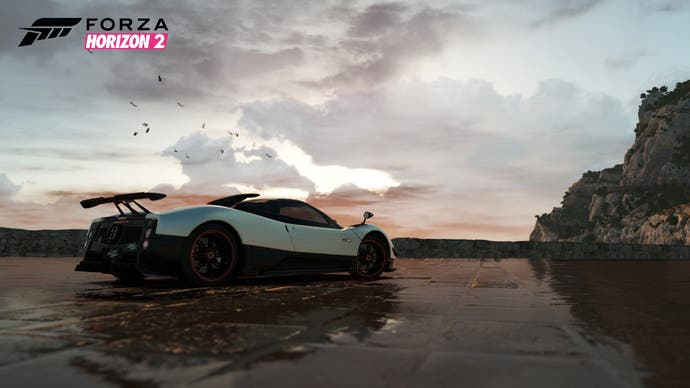
"I feel really good about it - it's less of a debate this time, and I feel it'll be less of a debate for a lot of people. Our proof point is Horizon, and with Horizon we proved that if you're locked to an absolutely solid 30fps, then the experience is perfect for the game. I think that carries over into Horizon 2, and makes that debate less difficult. Ourselves and Turn 10 are absolutely scrupulous about performance - about never dropping a frame, never tearing a frame. That was the case with Horizon, and it remains the case with Horizon 2."
The foundation laid out by the first Horizon was so solid, in fact, that it's hard to pick out headline additions for the sequel. That's only a testament to the first game's quality, of course, and those improvements are there, wrapped around the same chassis to make a more complete, compelling package. Multiplayer was the one area that let down the original, so it's no surprise to see a total overhaul here, with a system that does away with lobbies and allows players to engage with the freedom the open world presents, switching between solo and online within it with the simplicity of flicking a switch.
"We've learned a lot about online with this new generation," says Fulton, detailing how the Xbox One's Thunderhead - a dedicated subset of Microsoft's Azure cloud platform - has helped shape Horizon 2's multiplayer. "In terms of the amount of servers we can spin up, it's a different paradigm to how we were working with Forza previously. Dealing with online, and really thinking about online in a next-gen sense - and starting with really lofty goals, really high-minded principles in a lot of ways. Saying I don't want anyone to wait, I don't want anyone to sit in a lobby. We want changing between online and solo to be like changing channels on a TV. So how do you achieve that? You have to get players together in a different way. We did Horizon multiplayer a certain way and it was dictated by a number of factors. This generation is a clean slate, and how can next-gen multiplayer work?"
There are improvements to the solo play, too. The Horizon music festival still acts as a hub, though there's now more structure to the spokes that come from it. Road trips take you from one point of the map to another, filling in the long journey with races and events, and the reward system that sits across both single- and multiplayer is now more meaningful, with more reward. It's tempting to see some of that as a reaction to the reception Forza Motorsport 5 received, where a micro-transaction-fuelled economy made for a slow, sometimes unsatisfying trawl (though it's worth noting that, post-release, Turn 10 has done an excellent job of restoring the balance towards the player).
"Obviously that couldn't go unnoticed," Fulton says of the backlash against Forza Motorsport 5. "That was a big thing, and I felt bad for the team in the amount of criticism they attracted for that. In Horizon 2, we've always set out to ensure that the game feels fair, that the economy is balanced, and that they feel rewarded for the things they do in the game. That's the key to game design, in my experience - making people feel like they're achieving things, and that they feel adequately rewarded. Maybe even over-rewarded sometimes.
"That's to make you feel great. Horizon 2 will launch without micro-transactions, without the token system that you're familiar with from 5. That's really important to us - we want to put the game out and say here's the game. Tell us if it's broken, tell us if the economy doesn't feel fair. Although I can't wait to hear that feedback - I feel like, with all the play-testing we've done, we've got a very fair, balanced game."
Spending a couple of hours exploring Forza Horizon 2's world, where Playground's pliant handling model and eclectic selection of cars make joyous sense of the open roads of the European countryside, it's more than rewarding. Horizon 2 is the worthy successor to racing greats such as Project Gotham Racing 4, and as it goes against Evolution's DriveClub and Ivory Tower's The Crew, it's hard not to see the Xbox One game emerging at the head of the pack.
"One of the things that's great for me, personally, not just in terms of Playground and Horizon 2, it's the rude health the scene is in. We came from a place where people really didn't want to know about racing games - now you've got people working on new IP, reviving old franchises. It's a really great time for the genre."
Such is the quality of Horizon, and quite likely its sequel too, that you wonder whether Microsoft will move to get Playground Games under lock and key - or whether the privately owned studio might ever get itchy feet and let its ambition take it elsewhere. "This is our second game, I love working on Forza, I love working on our own little bit of Forza," says Fulton. "We came up with Horizon because it's the game we always wanted to play. The fact we've got the ability to make this game in what I think is the greatest racing franchise there is - why would we do anything else?"
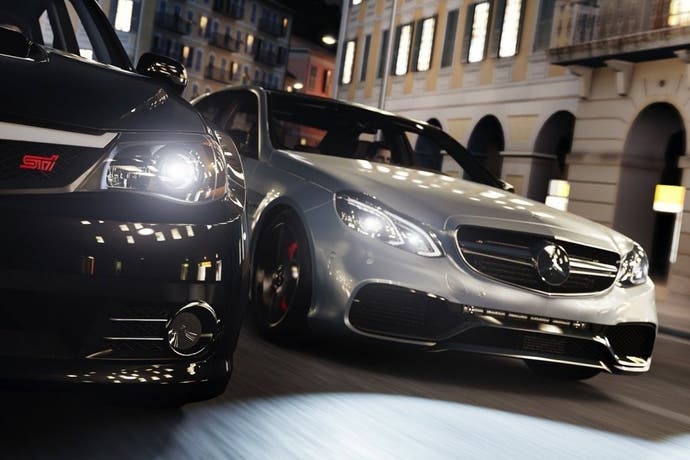



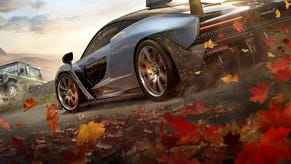

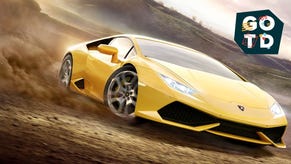
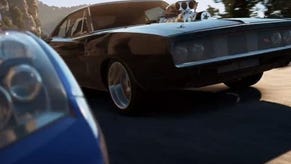
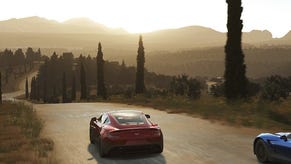
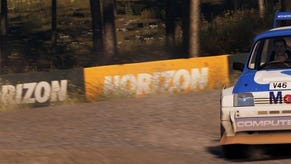
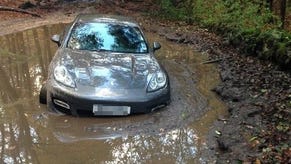




.png?width=291&height=164&fit=crop&quality=80&format=jpg&auto=webp)



